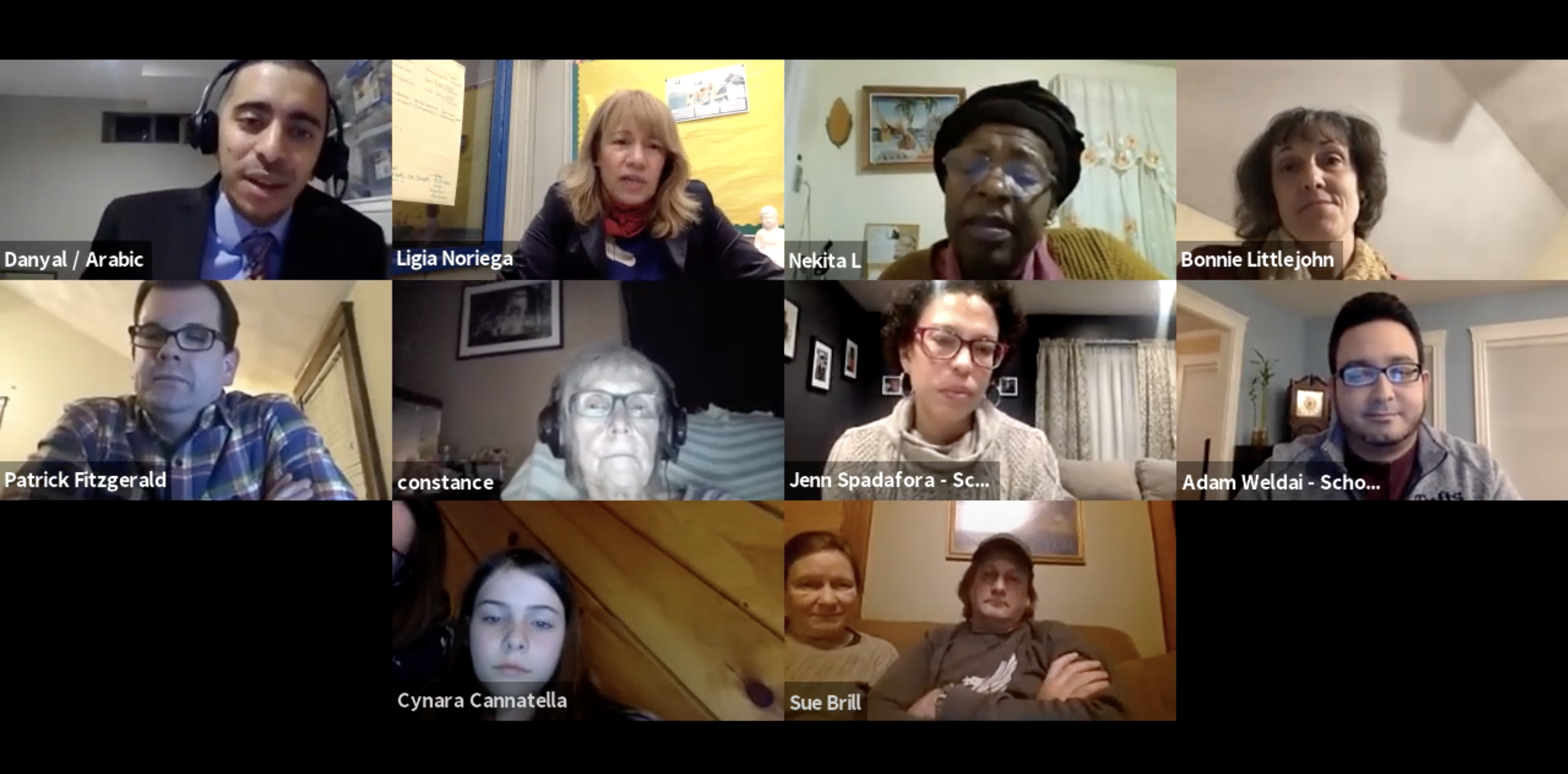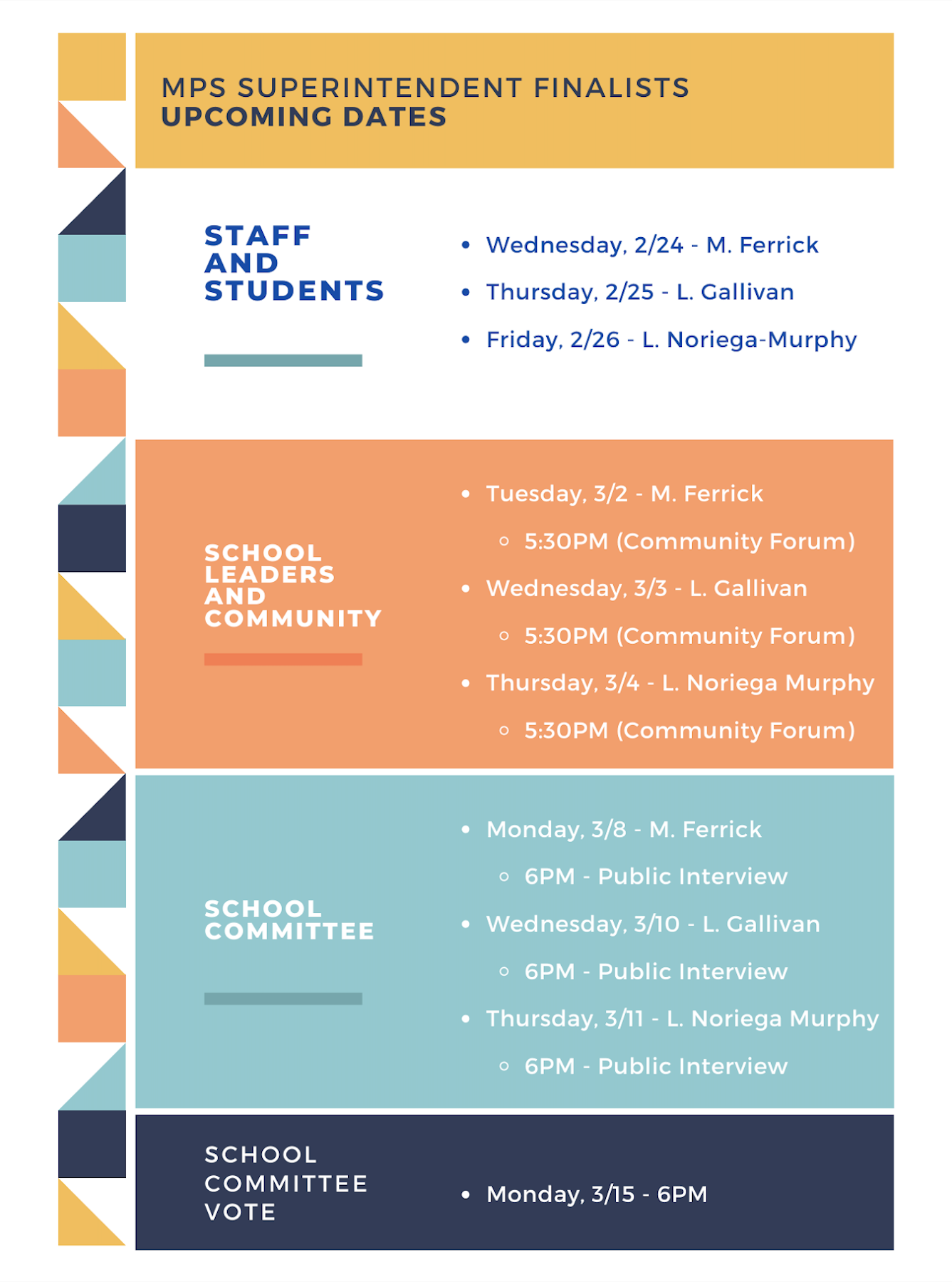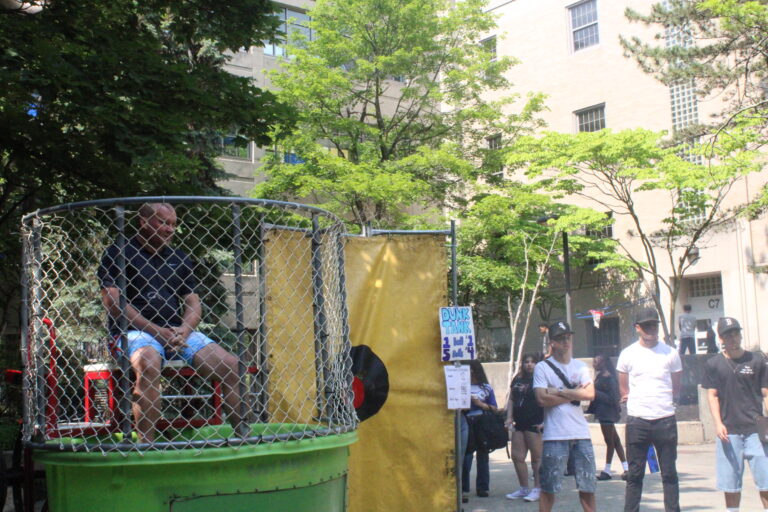
With the announcement of Superintendent John Oteri not seeking an extension to his contract in November, the Malden School Committee began its search for Malden’s next Superintendent of Schools. In order to help guide the process, Mayor Christenson appointed two School Committee members, Jennifer Spadafora and Adam Weldai, to co-chair the Superintendent Screening Committee. On March 15th, the Malden School Committee announced that Ligia Noriega-Murphy would be the next Superintendent of Schools and would assume her position on July 1st.

The process started in the beginning of December where the school committee selected an outside firm, the Collins Center from UMass Boston, to conduct the search. Spadafora explained that their process was to post the superintendent position on multiple websites, reaching out to different organizations in hopes of receiving a considerable amount of candidates. And with that, both Spadafora and Weldai then formed a search committee of an additional 15 members that consisted of teachers, school administrators and community members.
She went into detail how they were then tasked to look through the 37 resumes they had received. In a series of meetings, the committee discussed the strengths, areas of growth, and background experience of each individual applicant. From there on, the committee narrowed down their decisions to nine applicants and then had individual Zoom interviews with each of them. Repeating the process again, the screening committee met again collectively and discussed their pros and cons to each of those applicants and voted on who they would put through, eventually ending up with three finalists.
When it came to deciding on the three finalists, Weldai explained how each person on the committee was looking for something different, which he found to be a highlight of the process, because from his perspective, he was personally “looking for someone who was a strong communicator” and also an individual who has the experience with both the “instructional side of being a leader, but also the managerial side.” And he believed that with the committee consisting of such vast representatives from “as many different stakeholders of a school system as possible,” it enabled for “[them] to have those hard conversations with one another.”
Senior Billy Zeng, who was a student representative of the screening committee, expressed how both Spadafora and Weldai “did a wonderful job” in creating a committee that was “truly representative of different perspectives.” With the wide range of individual backgrounds, from paraprofessionals to students, Zeng found that the “diversity in thinking” was crucial when it came down to making decisions as each person “prioritized different aspects of the school experience.”
He continued on saying that there is a significance in being “exposed to new perspectives in education,” especially ones that you were never aware of before because he believes that it is beneficial when “different communities are represented and able to share their voice,” ultimately steering the decision on who would be the next superintendent.
With Zeng being a student himself, he noted the importance of how essential it is for students to be involved in processes like these as students are the ones who “know the school system the best” as they experience it on a daily basis whether that would be simply from “walking through the halls or logging onto Google Meets.” The student voice is valuable since “they have the firsthand knowledge” that sometimes other stakeholders may not be aware of.
Weldai mentioned how in previous years, past searches have not always been this inclusive. And this time, he stated how they needed to ask themselves “how do [they] attack this from every different angle” to ensure that people feel included in the process. Adding on to that thought, Spadafora emphasized how “we have always said that Malden is such a diverse community,” but in order to truly reflect that, you have to be able to “walk the walk” and not only “talk the talk.”
And so in order to “reach every corner of Malden” as Spadafora stated, the search recognized how they needed to include interpreters to make sure that “everybody had a voice.” In addition, she expressed that because one of the roles of a superintendent is to “represent the entire community,” it is important for every parent and student to be “given that opportunity to be heard.” She further added that the committee ensured to translate every documentation in regards to the search and upload them onto the MPS Superintendent Search website to allow people to be a part of the process.
Aside from the committee meetings that were held to review the applications, community forums and public interviews were organized each day in the first and second week of March to give members of the community an opportunity to learn more about the three finalists and what they had to offer to Malden. Interpreters were present translating the discussions that took place into seven different languages including Vietnamese, Cantonese, Portuguese, Arabic and more.

In these forums and interviews, community members had the chance to voice their questions towards each of the finalists whether that would be regarding their previous positions or how they would address current problems in the school system. After each meeting ended, the committee sent out Google forms to hear feedback from the community on what they thought of each candidate.
Weldai described that in the forums that were held, like the search committee, “everyone’s perspective [was] going to be different” and as a result, the questions that principles or parents were going to ask varied since “[they] are each looking at this from a different lens.” He stated that the feedback submissions the committee received were valuable in the decision making process because it was clear that the community wanted to be able to express on “what [they] want [their] leader to believe in.”
Students from MHS also had the opportunity to meet with the finalists in a Student Forum where they were able to pose questions to the candidates. Junior Sammi Nie, who was one of the students a part of the forum, explained that the process of meeting with each of them was “like [having] a regular conversation” because both “respect and energy was reciprocated.”
On top of that, Nie mentioned how the conversations mainly revolved around student voice and implementing greater diversity among faculty members and the curriculum. She believed that asking questions “that [they] deemed to be the most pressing” revealed what Malden needed in a superintendent that is “capable of supporting our diverse student body.”
Spadafora felt that all three finalists had both the background and the expertise when it came to academics and curriculum which made the decision difficult. However, she emphasized that the “job is not all about academics,” but rather it is also about being “a spokesperson for the district.”
Weldai agreed conveying how the job of a superintendent has become so vast that “there was never going to be a perfect candidate,” but ultimately they were looking for someone who “could be another puzzle piece” to fit in with the “great team” that the city and the schools already have.
With the announcement of Noriega-Murphy being the next superintendent, the committee hopes that moving forward in not only just superintendent searches, but in other searches as well that community members, parents and students are being involved in the process and be given a platform to voice their opinions.



